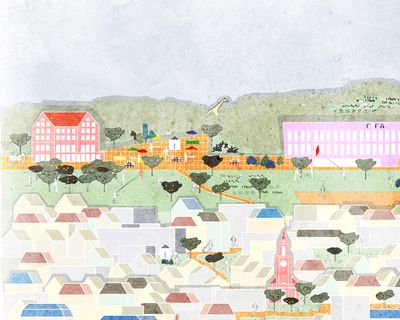Edible Commons: On the Southern Slope of ZürichbergHiroaki Anamizu, Khyati Andrapiya, and Francis Schoups
Agriculture and the commons have a long shared history. This is not only true for the Swiss alpine village of Törbel–the basis for Elinor Ostrom’s book “Governing the Commons”–but also for the City of Zurich. In contrast to Törbel, where collective management and organisation of meadows, barns, forests, vineyards and irrigation channels have persisted and form a resilient ecosystem, they have been lost on Zürichberg (Ostrom 1990 and Netting 1981). Our project investigates the revival of common food production in the City of Zurich.
The Edible Commons is supported by local Food Councils, where inhabitants, food growing communities, local authorities and institutions meet in dialogue. Historically, institutions have paved the way for the urbanisation of this exclusive hill. In the Food Council they assume the social responsibility associated with this privilege, providing space and collective infrastructure for food growing communities. Starting from a feminist perspective, the Edible Commons revalorises reproductive work and everyday life through the emphasis on food. This aims to raise awareness in the Zurich population, as most of Swiss food is imported from elsewhere. In the new landscape of Agoras, Edible Gardens and pathways, centres of sociality are established, where social cohesion is strengthened and the environment regenerated (Federici 2019). By sharing experiences, resources and knowledge, a food-enabling urban landscape takes shape on Zürichberg: an Edible Commons.
